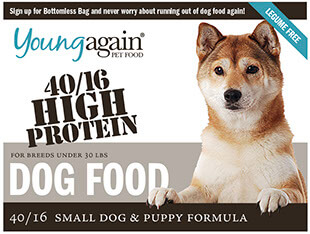
DogFoodAdvisor is reader supported See how
All reviews are 100% impartial but if you buy using links on this page, we may earn a referral fee.
Young Again Dog Food Review
Young Again Dog Food receives the Advisor’s top rating of 5 stars.
The Young Again product line includes the 2 dry dog foods listed below.
Each recipe includes its AAFCO nutrient profile when available… Growth (puppy), Maintenance (adult), All Life Stages, Supplemental or Unspecified.
| Product | Rating | AAFCO |
|---|---|---|
| Young Again 40/16 Small Dog and Puppy | 5 | A |
| Young Again Core Health Med- Large Dog and Puppy | 5 | A |
Recipe and Label Analysis
Young Again 40/16 Small Dog and Puppy was selected to represent both products in the line for detailed recipe and nutrient analysis.
Label and nutrient data below are calculated using dry matter basis.
Young Again 40/16 Small Dog and Puppy
Estimated Dry Matter Nutrient Content
Protein
Fat
CarbsCarbohydrates
Hydrolyzed pork, potato starch, chicken meal, chicken fat, tomato pomace (source of fiber), herring meal, fish meal, fish oil, dicalcium phosphate, brewers yeast, potassium citrate, potassium chloride, chicken liver flavor, powdered cellulose (source of fiber), choline chloride, fructooligosaccharides (FOS), sodium acid pyrophosphate, salt, dl methionine, taurine, potassium carbonate, vitamin E supplement, l-ascorbyl-2-polyphosphate (source of stabilized vitamin C), betaine anhydrous, salt, l-carnitine, magnesium sulfate, zinc sulfate, rosemary extract, Yucca schidigera extract, vitamin B12 supplement, niacinamide (vitamin B3), biotin (vitamin B7), thiamine mononitrate (vitamin B1), copper proteinate, folic acid (vitamin B9), vitamin A acetate, riboflavin (vitamin B2), calcium pantothenate (vitamin B5), dried Aspergillus oryzae fermentation extract, dehydrated Pediococcus acidilactici fermentation product, beta carotene, pyridoxine hydrochloride (vitamin B6), vitamin D3 supplement, mixed tocopherols, potassium sorbate and citric acid (preservatives)
Fiber (estimated dry matter content) = 3%
Red denotes any controversial items
| Estimated Nutrient Content | |||
|---|---|---|---|
| Method | Protein | Fat | Carbs |
| Guaranteed Analysis | 40% | 16% | NA |
| Dry Matter Basis | 44% | 18% | 30% |
| Calorie Weighted Basis | 38% | 37% | 25% |
Ingredient Analysis
The first ingredient in this dog food is hydrolyzed pork, pork meat that’s been hydrolyzed or broken down into its component amino acids and fat.
Hydrolyzed pork is highly digestible and (like other hydrolyzed ingredients) may be considered hypoallergenic.
The second ingredient is potato starch. Potato starch is a gluten-free carbohydrate of only modest nutritional value to a dog.
The third ingredient is chicken meal. Chicken meal is considered a meat concentrate and contains nearly 300% more protein than fresh chicken.
The next ingredient is chicken fat. Chicken fat is obtained from rendering chicken, a process similar to making soup in which the fat itself is skimmed from the surface of the liquid.
Chicken fat is high in linoleic acid, an omega-6 fatty acid essential for life. Although it doesn’t sound very appetizing, chicken fat is actually a quality ingredient.
The fifth ingredient is tomato pomace. Tomato pomace is a by-product remaining after processing tomatoes into juice, soup and ketchup. Many praise tomato pomace for its high fiber and nutrient content, while others believe it’s often used as an inexpensive pet food filler.
As the presence of fiber in a dog’s diet is shown to have great importance, we view the inclusion of tomato pomace in this food as a positive.
The next two ingredients include herring meal and fish meal, both protein-rich meat concentrates.
Fish meal is typically obtained from the “clean, dried, ground tissue of undecomposed whole fish and fish cuttings” of commercial fish operations.1
The eighth ingredient is fish oil. Fish oil is naturally rich in the prized EPA and DHA type of omega-3 fatty acids. These two high quality fats boast the highest bio-availability to dogs and humans.
Depending on its level of freshness and purity, fish oil should be considered a commendable addition.
The ninth ingredient is dicalcium phosphate, likely used here as a dietary calcium supplement.
From here, the list goes on to include a number of other items.
But to be realistic, ingredients located this far down the list (other than nutritional supplements) are not likely to affect the overall rating of this product.
With 5 notable exceptions…
First, brewers yeast can be a controversial item. Although it’s a by-product of the beer making process, this ingredient is rich in minerals and other healthy nutrients.
Fans believe yeast repels fleas and supports the immune system.
Critics argue yeast ingredients can be linked to allergies. This may be true, but (like all allergies) only if your particular dog is allergic to the yeast itself.
In addition, a vocal minority insists yeast can increase the risk of developing the life-threatening condition known as bloat. However, this is a claim we’ve not been able to scientifically verify.
In any case, unless your dog is specifically allergic to it, yeast can still be considered a nutritious additive.
What’s more noteworthy here is that brewers yeast contains about 48% protein, a factor that must be considered when judging the actual meat content of this dog food.
Next, powdered cellulose is a non-digestible plant fiber usually made from the by-products of vegetable processing. Except for the usual benefits of fiber, powdered cellulose provides no nutritional value to a dog.
In addition, this recipe contains fructooligosaccharide, an alternative sweetener2 probably used here as a prebiotic. Prebiotics function to support the growth of healthy bacteria in the large intestine.
Next, we note the use of taurine, an important amino acid associated with the healthy function of heart muscle. Although taurine is not typically considered essential in canines, some dogs have been shown to be deficient in this critical nutrient.
Since taurine deficiency appears to be more common in pets consuming grain-free diets, we view its presence in this recipe as a positive addition.
And lastly, with the exception of copper, the minerals listed here do not appear to be chelated. And that can make them more difficult to absorb. Chelated minerals are usually associated with higher quality dog foods.
Nutrient Analysis
Based on its ingredients alone, Young Again Dog Food looks like an above-average dry product.
But ingredient quality by itself cannot tell the whole story. We still need to estimate the product’s meat content before determining a final rating.
The dashboard displays a dry matter protein reading of 44%, a fat level of 18% and estimated carbohydrates of about 30%.
As a group, the brand features an average protein content of 39% and a mean fat level of 20%. Together, these figures suggest a carbohydrate content of 33% for the overall product line.
And a fat-to-protein ratio of about 51%.
Above-average protein. Above-average fat. And below-average carbs when compared to a typical dry dog food.
Even when you consider the protein-boosting effect of the brewers yeast, this looks like the profile of a kibble containing a significant amount of meat.
Our Rating of Young Again Dog Food
Young Again is a grain-free dry dog food using a significant amount of named meats as its dominant source of animal protein, thus earning the brand 5 stars.
Enthusiastically recommended.
Has Young Again Dog Food Been Recalled?
The following automated list (if present) includes all dog food recalls since 2009 related to Young Again.
No recalls noted.
You can view a complete list of all dog food recalls since 2009 here.
Get Free Recall Alerts
Get free dog food recall alerts sent to you by email. Subscribe to The Advisor’s recall notification list.
Related Topics
Readers interested in Young Again dog food may also wish to check out these popular pages, too…
Compare This Dog Food
How does this brand compare with The Dog Food Advisor's most recommended brands?
A Final Word
The Dog Food Advisor does not accept money, gifts, samples or other incentives in exchange for special consideration in preparing our reviews.
However, we do receive a referral fee from online retailers (like Chewy or Amazon) and from sellers of perishable pet food when readers click over to their websites from ours. This helps cover the cost of operation of our free blog. Thanks for your support.
For more information, please visit our Disclaimer and Disclosure page.







